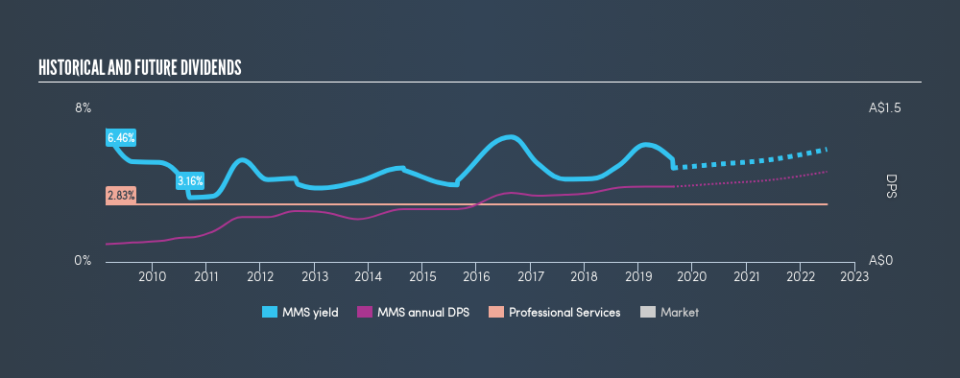It Might Not Be A Great Idea To Buy McMillan Shakespeare Limited (ASX:MMS) For Its Next Dividend

Regular readers will know that we love our dividends at Simply Wall St, which is why it's exciting to see McMillan Shakespeare Limited (ASX:MMS) is about to trade ex-dividend in the next 4 days. Ex-dividend means that investors that purchase the stock on or after the 28th of August will not receive this dividend, which will be paid on the 11th of September.
McMillan Shakespeare's next dividend payment will be AU$0.40 per share, on the back of last year when the company paid a total of AU$0.74 to shareholders. Looking at the last 12 months of distributions, McMillan Shakespeare has a trailing yield of approximately 4.6% on its current stock price of A$16.03. We love seeing companies pay a dividend, but it's also important to be sure that laying the golden eggs isn't going to kill our golden goose! That's why we should always check whether the dividend payments appear sustainable, and if the company is growing.
Check out our latest analysis for McMillan Shakespeare
Dividends are typically paid from company earnings. If a company pays more in dividends than it earned in profit, then the dividend could be unsustainable. Last year, McMillan Shakespeare paid out 96% of its income as dividends, which is above a level that we're comfortable with, especially if the company needs to reinvest in its business. That said, even highly profitable companies sometimes might not generate enough cash to pay the dividend, which is why we should always check if the dividend is covered by cash flow. It paid out more than half (54%) of its free cash flow in the past year, which is within an average range for most companies.
It's good to see that while McMillan Shakespeare's dividends were not well covered by profits, at least they are affordable from a cash perspective. Still, if this were to happen repeatedly, we'd be concerned about whether the dividend is sustainable in a downturn.
Click here to see the company's payout ratio, plus analyst estimates of its future dividends.
Have Earnings And Dividends Been Growing?
Stocks with flat earnings can still be attractive dividend payers, but it is important to be more conservative with your approach and demand a greater margin for safety when it comes to dividend sustainability. If business enters a downturn and the dividend is cut, the company could see its value fall precipitously. It's not encouraging to see that McMillan Shakespeare's earnings are effectively flat over the past five years. Better than seeing them fall off a cliff, for sure, but the best dividend stocks grow their earnings meaningfully over the long run.
Another key way to measure a company's dividend prospects is by measuring its historical rate of dividend growth. Since the start of our data, 10 years ago, McMillan Shakespeare has lifted its dividend by approximately 16% a year on average.
The Bottom Line
Has McMillan Shakespeare got what it takes to maintain its dividend payments? Flat earnings per share and a high payout ratio are not what we like to see, although at least it paid out a lower percentage of its free cash flow. Bottom line: McMillan Shakespeare has some unfortunate characteristics that we think could lead to sub-optimal outcomes for dividend investors.
Ever wonder what the future holds for McMillan Shakespeare? See what the five analysts we track are forecasting, with this visualisation of its historical and future estimated earnings and cash flow
A common investment mistake is buying the first interesting stock you see. Here you can find a list of promising dividend stocks with a greater than 2% yield and an upcoming dividend.
We aim to bring you long-term focused research analysis driven by fundamental data. Note that our analysis may not factor in the latest price-sensitive company announcements or qualitative material.
If you spot an error that warrants correction, please contact the editor at editorial-team@simplywallst.com. This article by Simply Wall St is general in nature. It does not constitute a recommendation to buy or sell any stock, and does not take account of your objectives, or your financial situation. Simply Wall St has no position in the stocks mentioned. Thank you for reading.

 Yahoo Finance
Yahoo Finance 
